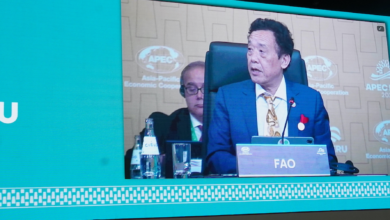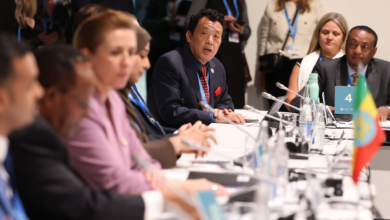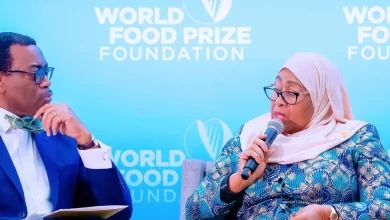Expert Urges Integration Of Technology Into Africa’s Food System

The Project Manager of Open Forum on Agricultural Biotechnology (OFAB), Mr Vitumbiko Chinoko, said Africa must integrate technology into its food systems if it will achieve food security.
Chinoko said this, virtually, in his presentation at the inauguration of OFAB Day, with seven participating African countries on Tuesday in Abuja.
The theme of the event was “Celebrating strides in bridging the knowledge gap in agricultural biotechnology towards agricultural transformation in Africa’’.
He said for this to be successful, Africa should bring on board food technologists and blend the two together to achieve not only food security but also nutrition security for the people.
According to him, the current food report shows that Africa’s food is insecure, and the number of malnourished people is steadily on the rise, standing at 282 million, which is only next to Asia’s 418 million.
“Undernourishment is a precursor for an impoverished Africa and a child that is malnourished cannot perform a task and undernourishment is an indicator of plunging further into poverty,’’ Chinoko said.
He stressed the need for African government to embrace agricultural biotechnology.
He added that it would be impossible to achieve food security in the face of climate change among other factors without agricultural biotechnology.
Dr Wilber Ottichilo, Governor of Vihica County in Kenya, speaking on “Agricultural Biotechnology in Africa: Lessons from policy and politics”, noted that any country that would not embrace science, technology and innovation would be left behind.
He said that in spite of controversies and challenges confronting biotechnology, with biosafety regulations in place, many African countries were moving forward with the technology.
Ottichilo emphasised the need for and importance of good communication which would enable people and politicians to absorb new technologies.
“OFAB should take strong position to ensure that media and publications are kept abreast of new developments on technology.
“Technology is here to stay, particularly agricultural biotechnology necessary for food security for any nation on the continent and the planet,’’ he said.
The governor assured that stakeholders would continue to push for the adoption of biotechnology in the world.
Prof Abdullahi Mustapha, Director-General, the National Biotechnology Development Agency (NABDA), remarked that issues of biotechnology and genetic engineering were totally absent in public discourse until OFAB came to the scene.
He said no project or programme has reached out to Nigerians in the 36 states of the federation, with 774 local governments and the six geo-political zones, like OFAB.
“`From Abeokuta in Southwest to Taraba and Gombe in the Northeast to Kano, Kaduna in the Northwest and Benue in North central and Port Harcourt in South-South, to Imo in the Southeast.
“OFAB has taken the message of hope and agricultural revival to the doorsteps of Nigerians,’’ Mustapha said.
The NABDA DG further said that OFAB drove the process that culminated in the establishment of National Biosafety Management Agency, with such efficiency that all stakeholders supported OFAB to actualise the dream.
Mustapha said it had also taken the heat off government and its officials, in defence of the emerging technology and its products, delivering to Nigeria a well-structured platform that responded swiftly to misinformation.
Speaking in an interview on the sideline of the event, Dr Shuaibu Madogo, Head, Planning Research and Statistics, at the Agricultural Research Council of Nigeria (ARCN), enumerated benefits of biotechnology.
He said that the use of biotechnology had brought varieties of crops that had higher yields and resistance to certain diseases and pests.
He spoke about Biotech (Bt) cotton and Bt cowpea, that comes with less agronomical practice with reduction in herbicide and pesticide spray.
Dr Rose Gidado, Country Coordinator of OFAB, also said in an interview that the event was an inaugural day for OFAB in Nigeria and that they were counting the gains and giant strides being recorded.
She said that the Biosafety Bill was one of such gains where the organisation singlehandedly facilitated the passage by the National Assembly, which was eventually signed into law by the president.
Gidado also listed various achievements of OFAB in Nigeria, while speaking extensively on the need to impact on the livelihood of the people and poor resource farmers, so that they could access quality seeds.
“Today we have two crops that have been commercialised in Nigeria, and we are celebrating and counting so many gains.
“ In Nigeria, OFAB has played many major roles in uniting the Agricultural `Research Institutes and bringing it together with the NABDA and then working as a team.
“The success story has been through pragmatic partnership and all the stakeholders coming together,” Gidado said.
High point of the event was the presentation of ‘2020/2021 OFAB Africa Journalism Grant’ to deserving African journalists in 6 different categories.
In Nigeria, Mrs Ngozi Onyejiaku, of AIT won in the television category, while Mr Vincent Yusuf of Daily Trust, won in the print category.





